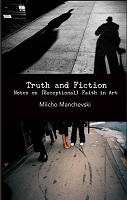Truth and Fiction: Notes on (Exceptional) Faith in Art
Author(s)
Manchevski, Milcho
Contributor(s)
Martin, Adrian (editor)
Collection
ScholarLedLanguage
EnglishAbstract
Reflecting upon his experience making his 2010 feature film Mothers, a cinematic triptych interweaving three narratives that are each, in their own way, about the often tenuous lines between truth and fiction, and one of which actually morphs into a documentary about the aftermath in a small Macedonian town where three retired cleaning women were found raped and killed in 2008 and the murderer turned out to be the journalist covering the story for a major Macedonian newspaper, the Oscar-nominated Macedonian-born and New York-based writer-director Milcho Manchevski writes that, “Most of us look at films differently or accept stories in a different way if we believe that they are true. We watch a documentary film in a different way from the way we watch a drama. We read a magazine article in a different way from the way in which we read a short story. Sometimes, we even treat a film that employs actors differently than a regular drama because we were told that it is based on something that really happened. We treat these works based on truth or reporting on the truth in different ways. “Why? “What is it in our relation to reality or in our relation to what we perceive to be reality that makes us value a work of artifice (an art piece) differently depending on our knowledge or conviction of whether that work of artifice is based on events that really took place?”
Keywords
aesthetics; Macedonia; film studies; cinema véritéDOI
10.21983/P3.0007.1.00ISBN
9780615647104OCN
945782708Publisher
punctum booksPublisher website
https://punctumbooks.com/Publication date and place
Brooklyn, NY, 2012Classification
Film history, theory or criticism


 Download
Download